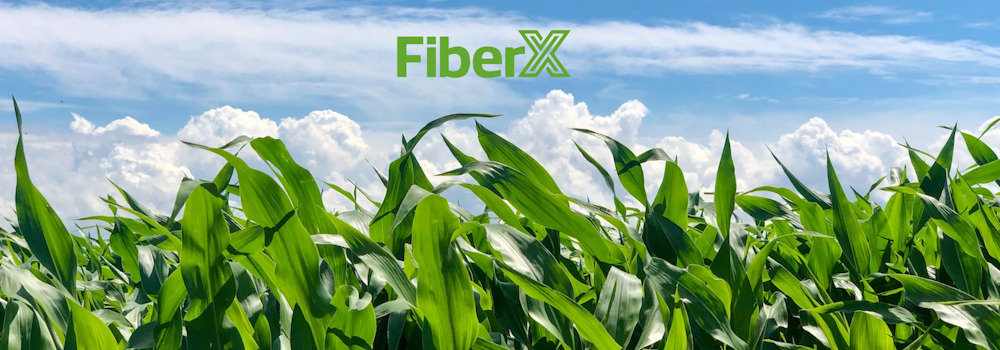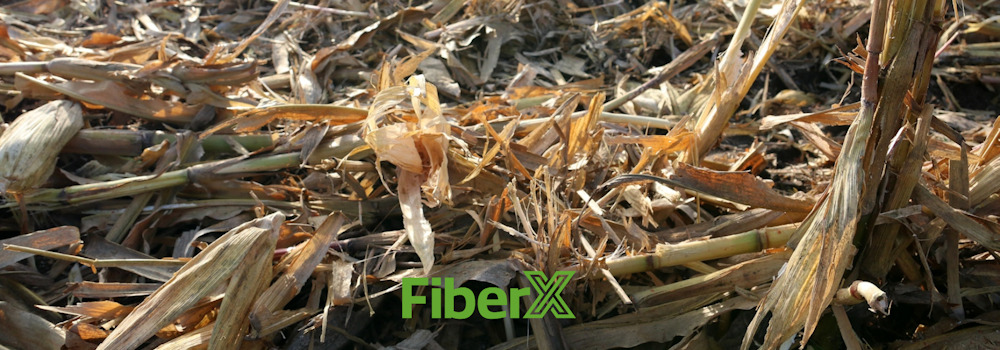I’ve known Wade Lange for many years, mainly through his past role as vice president and chief entrepreneurial officer at the Purdue Research Foundation. Like me, Wade grew up in West Lafayette and went to Purdue. He went off to a career at Lilly and later with a series of biotech startups before landing at Purdue. He is now the co-founder of FiberX with Dave Skibinski, an Indiana University grad and former team manager for famed IU coach Bobby Knight. I’m sure Dave’s got some stories! The two serial entrepreneurs have teamed up with FiberX, which is converting the familiar ag waste product, corn stover, into bio-based industrial products that are sustainable alternatives to petroleum-based products. I invited Dave and Wade to meet with the VisionTech Angels Screening Committee in May. The group was impressed with FiberX, its novel approach to the need for sustainable biopolymers and invited them to present at our June 22nd virtual pitch events. Here’s a preview.

BP: How do you know VisionTech Angels?
WL: I go way back with VisionTech, maybe even before you were Stepstone Partners because of my relationship with Oscar Moralez. We were both involved in biotech companies and with Purdue, so our paths crossed often. When you joined VisionTech, I leaned on you to come speak to faculty and student entrepreneurs at the Purdue Research Foundation
BP: How do you two guys, graduates of huge rivals, IU and Purdue, know each other?
DS: I wish I could say we met at a basketball game in Bloomington, but that’s not the case! The real story is Wade tried to recruit me to Purdue in 2021 when he was the chief entrepreneur officer at the Purdue Research Foundation. He thought I would make a great entrepreneur-in-residence based on my background in medical technology and with a startup I’d co-founded called SnapMD, which was at the forefront of telemedicine. We exited in early 2021 and I needed a new challenge. While I turned Wade down on the residency, we ended up launching a new venture together, FiberX.
BP: How’d you pull that off, Wade?
WL: Working at Purdue I was exposed to some incredible faculty and their technologies. One of them was Jim Caruthers, a chemical engineering professor who has dedicated his career to polymer science. He’d developed technology to convert biomass such as corn stover into “green” adhesives for engineered wood products. When Dave mentioned he wanted to start another company, I introduced him to Jim. Dave saw the potential immediately. After much discussion, we decided to co-found FiberX. Dave is the CEO focused on building the business and our core capabilities angle, while I’m chief commercial officer and boots on the ground here in Indiana.
BP: What exactly is corn stover?
DS: I can’t believe you’re from Indiana and don’t know what corn stover is, Ben! Corn stover is the stalks, husks, leaves, and cobs that remain after field corn is harvested. While some is used to feed livestock and as bedding, the bulk of it is not commercially used. In many cases, farmers leave it in the field to degrade to help control soil erosion and to return nutrients such as nitrogen, potassium and phosphorus to the soil when they plow the stover back into the soil. Corn stover is the world’s and Indiana’s largest agricultural waste product.

BP: What unmet need are you solving?
WL: We’re solving problems on both sides of the coin. Farmers have taken a beating these last few years. Their input costs are up, commodity pricing for corn is down, and they’re always battling Mother Nature for a good crop. Corn stover is FiberX’s raw material. By purchasing this byproduct following the corn harvest, we’re creating a new revenue stream for farmers. Talking with many Indiana farmers, we know that they are open to selling stover if the economics work out because their high corn yields are producing tremendous amounts of stover.
The other side of the coin are the industrial markets that are interested in replacing petroleum-based adhesives and plastics with environmentally friendly biomaterials that have the same if not better performance characteristics. We’re bioindustrial resins and biocomposite plastics with sustainable corn stover as a feedstock rather than petroleum. With our resins, we’re also eliminating the use of formaldehyde as a curing agent. Although widely used in the production of plywood, other manufactured board and resins as well as cosmetics and medicines, formaldehyde is highly toxic, flammable at room temperature, and can be a cause of lung disease and cancer. So for manufacturers, eliminating the need for formaldehyde removes a potential safety and health hazard.
BP: The push to replace petrochemical-based adhesives and plastics is a global movement. What is your initial target?
DS: It absolutely is. Global companies that use plastics in their products or packaging have clear, and in many cases, aggressive sustainability goals regarding plastics. This includes recycling, reusing, reducing the amount of plastic used, reducing the amount of petroleum used to manufacture those products, and ultimately replacing plastics with renewable biomaterials. The demand for alternatives is there. However, the biomaterials market is in its infancy. There are products on the market and in aggressive testing with corporate partners.
We have three different product categories we’re focused on, with increasing product value. First up and the fastest route to market entry is processed corn stover, which is added to synthetic or natural plastics to create biocomposite plastics. Next are intermediate products, lignin and cellulose, which are used as sustainable ingredients if you will for many products, including packaging. Finally, we have our proprietary formulations, the adhesive resins for composite wood products that include flooring, furniture, sheathing, and cabinets that are made from composite and engineered wood products rather than solid wood. For example, La-Z-Boy upholstered furniture is made with composite woods as is much of the furniture from IKEA and Target for example.
BP: How is your material different from other biopolymers already on the market?
WL: The big difference is our raw material, corn stover. It’s plentiful and an agricultural waste product versus corn, soybeans, and wood pulp that are also used in biopolymers, but are all primary market products. Currently, there’s only one marketed non-petroleum adhesive resin. It does not meet customer requirements and it’s really expensive. We want to step up quickly with a sustainable resin that works.

BP: What is your total addressable market?
DS: The total addressable market for green chemicals and materials globally is projected to reach $229 billion by 2030. The global market for our initial products, adhesive resins, is $8 billion.
BP: What kind of intellectual property protection do you have?
WL: We have an exclusive option from Purdue to license five pieces of intellectual property that cover the manufacturing processes for the adhesive resin. Our plan is to exercise the options in the second half of this year. We will also have numerous trade secrets as every product formulation we create will be unique to its target use case.
BO: Where are you in terms of commercialization?
WL: From the supply side, we’re building relationships with farmers and agronomists and also working with farmer-owned cooperatives in the Midwest to build the raw material supply chain. Some are ready to start right away, and others want to wait and see, which is common regardless of the industry.
DS: We’ve achieved our proof of concepts on our stover processing and have produced product prototypes. We are in discussions with several of the largest lumber and engineered wood companies in North America that are looking for sustainable resins and materials that won’t compromise performance but will help meet sustainability objectives. We have a terrific project with Purdue this summer with our resin, and the early results are very exciting. We have also completed our proof-of-concepts for our biocomposite plastic product line. We are now conducting iterative product development to refine these product formulations. Our goal with these biocomposite plastics is to replace 40% of petrochemical-based plastics. This is a win for global companies as it reduces their reliance on traditional plastics and helps them reach their sustainability goals.
BP: What round is this?
DS: This is a $500,000 pre-seed round.
BP: What is your planned use of funds?
DS: The primary uses are to build and refine our stover processing and supply chain, produce sample resin and boards to take to the engineered wood industry, and finally, produce samples of biocomposite plastics to take out to a variety of industries committed to reducing their use of traditional plastics.

BP: Give me three reasons why VisionTech Angels members should invest.
WL: FiberX is creating an entirely new industry for Indiana and has a huge market opportunity with a short-term path to revenue. Second, we’re leveraging Indiana’s strengths in agriculture and manufacturing. Finally, we have an exceptionally strong team including two serial entrepreneurs with experience and multiple exits in hard tech, our CTO Tom Santelli who has led technology and product development at the largest board manufacturers, a multi-generational Indiana farming family, and a tremendous team at the Purdue School of Chemical Engineering
DS: Plus, we’re leveraging the industrial manufacturing and rural farming assets of Indiana. And there’s the whole IU-Purdue thing. Something for everyone who likes to support Indiana companies.
BP: Thanks guys! This sounds like a great pitch and opportunity.
VisionTech Angels’ Pitch Events will be virtual on Thursday, June 22 at Noon and live at 6 p.m. ET at KSM at 800 E 96th St #500, Indianapolis. Pitch events are open to our members and accredited investors interested in joining our group. To register, check your email for an invitation, go to our Events page where you’ll find the RSVP links, or email Ben Pidgeon at bpidgeon@visiontech-partners.com.

